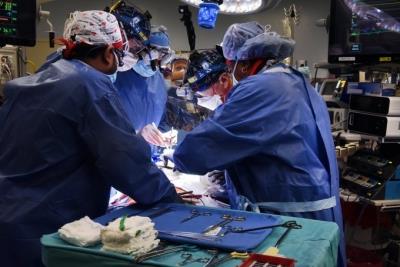TN Revamps Organ Transplant Oversight Committees Amid Rising Concerns
The Government Order, issued on September 8 by Principal Secretary, Health and Family Welfare, P. Senthilkumar, said the restructuring was carried out under the Transplantation of Human Organs and Tissues Act, 1994, and the 2014 rules framed under it.
The move seeks to enhance transparency, strengthen ethical compliance, and restore public confidence in the state's organ donation system.
At the state level, the Authorisation Committee will now be chaired by the Director of Medical Education and Research, Kilpauk, Chennai. Its members will include the Deans of Stanley and Kilpauk Medical Colleges, senior police officers, a woman doctor nominated by the Indian Medical Association (IMA), and officials from the Directorate of Medical and Rural Health Services.
The state committee will examine applications from foreign nationals and out-of-state Indians seeking transplants in Tamil Nadu, while also monitoring the functioning of district-level committees.
Four regional committees have been set up at Chennai (northern region), Thanjavur (central), Coimbatore (western), and Madurai (southern).
Headed by the Deans of the respective government medical colleges, these committees will review and decide on transplant applications within their jurisdictions.
Their membership will include senior doctors, district administration representatives, senior police officers, and women doctors from the IMA. The committees are tasked with verifying donor-recipient relationships, checking the authenticity of documents, and ensuring there is no coercion.
In cases involving unrelated donors, greater scrutiny will be applied with the support of police and revenue officials. Reputed non-profit organisations may also be engaged to counsel donors and recipients on medical, legal, and psychological aspects. To strengthen record-keeping, all authorised hospitals must submit monthly reports on transplant applications and outcomes.
A processing fee of Rs 2,000 per application has been fixed, with 50 per cent allocated to the state exchequer and the rest to meet the committees' administrative expenses.
Officials emphasised that the revamped system aims to balance urgent medical needs with robust safeguards against exploitation, ensuring Tamil Nadu's organ transplantation framework remains transparent, accountable, and humane.

Legal Disclaimer:
MENAFN provides the
information “as is” without warranty of any kind. We do not accept
any responsibility or liability for the accuracy, content, images,
videos, licenses, completeness, legality, or reliability of the information
contained in this article. If you have any complaints or copyright
issues related to this article, kindly contact the provider above.
Most popular stories
Market Research

- Japan Buy Now Pay Later Market Size To Surpass USD 145.5 Billion By 2033 CAGR Of 22.23%
- BTCC Summer Festival 2025 Unites Japan's Web3 Community
- GCL Subsidiary, 2Game Digital, Partners With Kucoin Pay To Accept Secure Crypto Payments In Real Time
- Smart Indoor Gardens Market Growth: Size, Trends, And Forecast 20252033
- Nutritional Bar Market Size To Expand At A CAGR Of 3.5% During 2025-2033
- Pluscapital Advisor Empowers Traders To Master Global Markets Around The Clock






















Comments
No comment